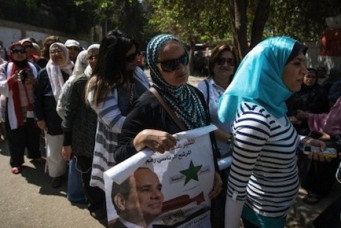After Revolution, Entry Points for Egyptian Youth
If we aspire to achieve responsive governance in Egypt to reform our institutions, there are many channels to enable the youth so they can play a role: from within the government bureaucracy, from within the private sector and non-government sector, through organized political and advocacy activities, and through conventional and non-conventional media and communication tools.
More and more, we are realizing the need to partner with youth and capitalize on their resources and capabilities to achieve good governance in Egypt. The January 25 revolution was definitely a wake-up call to the older generations.
If we aspire to achieve responsive governance in Egypt to reform our institutions, there are many channels to enable the youth so they can play a role: from within the government bureaucracy, from within the private sector and non-government sector, through organized political and advocacy activities, and through conventional and non-conventional media and communication tools.
One entry point for the youth is in government service. Overall, youth in the Egyptian government sector do not get enough opportunity in leading or implementing reform since they are concentrated mostly in the lower echelons of the hierarchy. Rethinking our internal management systems within the government agencies by shifting to competency-based human resource management systems and implementing pay for performance compensation systems, would grant the younger generation a chance for rising up the hierarchy and having a greater role in decision-making based on their qualifications, skills and abilities, rather than just based on seniority.
A second entry point would be for the youth to have a greater chance in managing private sector and non-governmental organizations that act as competitors to government and drivers of quality improvement. The more government organizations, whether providing health, educational or maybe technology related services, face competition from the private sector and NGOs, the more they will be forced to upgrade the quality of their outputs. The young generation can play a significant role in that regard.
A third entry point is through civil society organizations, especially advocacy, human rights organizations and political parties. The young people of Egypt from now on should have a more active role in the organized political arena, by either starting their own political parties and advocacy groups or joining those already established and make positive contributions.
Finally, a fourth and very vital entry point for youth, which was put to good use during the recent revolution, is through the utilization of both conventional and non-conventional media channels to organize their role in monitoring government’s performance and holding it accountable. The April 6 Movement, the Shayfenkom Movement and the writing of bloggers such as Wael Abbas are a few examples of the many youth efforts that left an imprint on the recent monumental uprising in Egypt.
So what should the youth do? They should work on upgrading their competencies and skills to meet the demands of the labor market and realize that the new trend of competency based human resource management requires an incessant updating of skills, and that learning is a continuous process.
They should seek employment in the private sector and thus provide competition to the services provided by government and raise standards. They should adopt a more developmental objective and engage more in volunteer work through non-governmental organizations partnering with government to achieve sustainable development. They should hone their Internet and ICT skills further to better organize their monitoring of government performance, whistle blow and report on any corruption or unethical conduct taking place in government organizations.
They should definitely not wait another thirty years like former generations before they take concrete action.
Laila El Baradei is the Associate Dean of the School of Global Affairs and Public Policy, American University in Cairo
Subscribe to Our Newsletter



